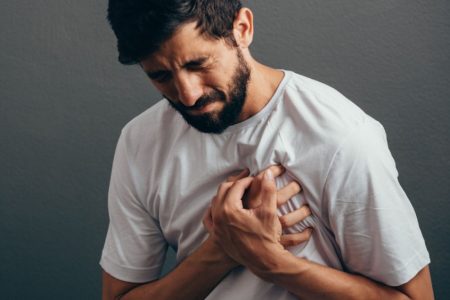Our Heart during a Heart Attack
- Updated on: Jul 9, 2024
- 3 min Read
By
- Published on Oct 3, 2019


What is a heart attack?
A heart attack also known as myocardial infarction (MI) is a medical emergency. In myocardial infarction, “myo” refers to muscle, “cardial” refers to the heart and “infarction” refers to the death of tissue resulting from a lack of blood supply. Therefore, heart attack refers to a permanent damage to the heart muscle.
Generally, heart muscle needs an adequate supply of blood at all times to function properly. This blood is received from the coronary arteries.
Read more about heart attack.
What is a coronary artery disease?
Coronary artery disease refers to a disease that damages the major blood vessels of the heart. It happens when the coronary arteries are narrowed or blocked by atherosclerosis.
Atherosclerosis (hardening or clogging of the arteries) is also known as atherosclerotic cardiovascular disease. It is the buildup of cholesterol, fats and other substances (called plaque) on the inner walls of the arteries. This buildup of plaque restricts blood flow to the heart.
When adequate blood is not fueled into the heart, it becomes starved of oxygen and the vital nutrients needed to work properly and efficiently. This situation can give rise to chest pain called angina. A heart attack occurs when one or more of the coronary arteries are completely blocked.
More: Heart Attack Symptoms in Men (Myocardial Infarction Symptoms in Men)
More: Heart Attack (Myocardial Infarction) Signs and Symptoms in Women
Explaining what occurs in a myocardial infarction: What happens to your heart rate when you have a heart attack?
The heart muscle is surrounded by a network of blood vessels. These blood vessels are known as coronary arteries. The main function of these arteries is to supply blood rich in oxygen and other nutrients. In order to function efficiently, the heart muscle needs an abundant supply of the blood.
A heart attack occurs when suddenly a coronary artery becomes blocked. Therefore, the flow of blood to the heart muscle is stopped. This damages the heart muscle.
Now, the question arises, why and how the coronary arteries are blocked?
When the fat builds up inside the walls of the arteries, blood vessels walls are damaged slightly. The cells release a chemical in order to heal the blood vessel walls. The chemical released is helpful in making the blood vessel walls stickier. Because the walls are now stickier, other substances (such as inflammatory cells, cellular waste products, proteins and calcium) traveling through the bloodstream begin to stick to the vessel walls. This build-up of fat and other substances on the vessel walls combine to form a material called plaque.
With time, the development of plaque also increases. The plaque so developed varies in size and type. Most of the plaque deposits are soft on the inside with a hard covering on the outside. When the hard part of the plaque cracks, platelet (particles found in the blood that helps in clotting) come to the area and clots the cracked plaque. This blood clot sometimes blocks an artery completely making it hard for blood to reach the heart muscle. This makes the heart muscle starved for oxygen. After this, the following actions take place inside the human body:
- The nervous system immediately sends a signal to the brain about what’s going on
- Patient start sweating and the heart rate speeds up
- The patient also feel nauseous and weak
- The nervous system sends signals to the spinal cord making other body parts to ache
- Patient starts feeling an immense chest pain
- The pain slowly radiates towards neck, jaw, ears, arms, wrists, shoulder blades, back, and even in the abdomen
If the situation continues for a particular time, the cells of the heart muscle die due to lack of oxygen and cause permanent damage to the heart muscle. This permanent damage is known as myocardial infarction or heart attack.
Healing process after a heart attack
Healing of the heart muscle begins soon after a heart attack. It may take about eight weeks. Just like any other wound on the skin, the heart’s wound heals slowly and a scar will be left in the damaged area. The tissue with scar does not work as efficiently as other tissues. So, the pumping ability of a heart is lessened after a heart attack. The amount of pumping ability thus lost depends on the size and location of the scar left after a heart attack.













1 Comment
I am constantly thought about this, thankyou for putting up.